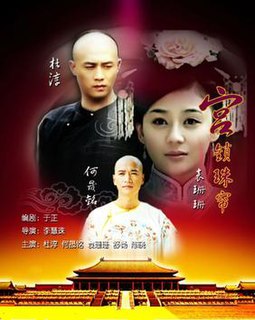Consort Qi may refer to:
Consort Qi may refer to:
Empress (Dowager) Lü Zhi, commonly known as Empress Lü and formally Empress Gao of Han, was the empress consort of Gaozu, the founding emperor of the Han dynasty. They had two known children, Liu Ying and Princess Yuan of Lu. Lü was the first woman to assume the title Empress of China and paramount power. After Gaozu's death, she was honoured as Empress Dowager and Regent during the short reigns of Emperor Hui and his successors Emperor Qianshao of Han and Liu Hong.

The Qianlong Emperor was the sixth Emperor of the Qing dynasty and the fourth Qing emperor to rule over China proper, reigning from 1735 to 1796. Born Hongli, the fourth son of the Yongzheng Emperor, he reigned officially from 11 October 1735 to 8 February 1796. In 1796, he abdicated in favour of his son, the Jiaqing Emperor—a filial act in order not to reign longer than his grandfather, the Kangxi Emperor, who ruled for 61 years. Despite his retirement, however, he retained ultimate power as the Retired Emperor until his death in 1799, making him one of the longest-reigning monarchs in history, and, dying at the age of 87, one of the longest-lived.

The Yongzheng Emperor was the fourth Emperor of the Qing dynasty, and the third Qing emperor to rule over China proper. He reigned from 1722 to 1735. A hard-working ruler, the Yongzheng Emperor's main goal was to create an effective government at minimal expense. Like his father, the Kangxi Emperor, the Yongzheng Emperor used military force to preserve the dynasty's position.

Emperor Hui of Han was the second emperor of the Chinese Han dynasty. He is also known as Han Huidi. He was the second son of Emperor Gaozu, the first Han emperor, and Empress Lü from the powerful Lü clan. Han Huidi is generally remembered as a somewhat weak character dominated and terrorized by his mother, Lü.

Emperor Jing of Han was the sixth emperor of the Chinese Han dynasty from 157 to 141 BC. His reign saw the limiting of the power of the feudal kings/princes which resulted in the Rebellion of the Seven States in 154 BC. Emperor Jing managed to crush the revolt and princes were thereafter denied rights to appoint ministers for their fiefs. This move helped to consolidate central power which paved the way for the long reign of his son Emperor Wu of Han.

Yunreng, born Yinreng, was a Manchu prince of the Qing dynasty. He was the second among the Kangxi Emperor's sons to survive into adulthood and was designated as Crown Prince for two terms between 1675 and 1712 before being deposed. He was posthumously honoured as Prince Limi of the First Rank.

The Niohuru were a prominent Manchu clan during the Qing dynasty. The clan had inhabited the Changbai Mountains since as early as the Liao dynasty. The clan was well known during the Qing dynasty for producing a variety of consorts of all ranks for emperors, several of whom went on to become mothers to reigning emperors. Prominent people who belonged or trace heritage to the Niohuru clan including famed Manchu warrior Eidu, his son the high official Ebilun, the Empress Dowager Ci'an, the infamous corrupt official Heshen, the contemporary concert pianist Lang Lang and Lang Tsuyun, Taiwanese TV, movie and stage actress, singer and producer

Empress Xiaogongren, of the Manchu Plain Yellow Banner Uya clan, was a posthumous name bestowed to the consort of Xuanye, the Kangxi Emperor and mother of Yinzhen, the Yongzheng Emperor. She was honoured as Empress Dowager Renshou during the reign of her son and posthumously honoured as empress, although she never held the rank of empress consort during her lifetime.

Empress Xiaoshengxian, of the Manchu Bordered Yellow Banner Niohuru clan, was a posthumous name bestowed to the consort of Yinzhen, the Yongzheng Emperor and mother of Hongli, the Qianlong Emperor. She was honoured as Empress Dowager Chongqing during the reign of her son and posthumously honoured as empress, although she never held the rank of empress consort during her lifetime.
Empress Song was an empress of the Han dynasty of China. She was Emperor Ling's first wife, and later became a victim of the powerful eunuchs.
Empress Hu (胡皇后) may refer to:

Palace II is a 2012 Chinese television series written and produced by Yu Zheng and directed by Lee Wai-chu. It is a sequel to the 2011 television series Palace. The series was first broadcast on HBS in China from 20 January to 8 February 2012. It was followed by Palace 3: The Lost Daughter (宫锁连城), and the film The Palace , otherwise known as The Palace: Lock Sinensis (宫锁沉香).
Consort Zhang may refer to:

Imperial Noble Consort Shujia, of the Korean Gingiya clan which was placed into the Manchu Plain Yellow Banner after her death, was a consort of the Qianlong Emperor. She was two years his junior. Imperial Noble Consort Shujia was also the Qing Dynasty's only imperial concubine from Korea.
Imperial Noble Consort Chunque, from the Han Chinese Geng clan, was a consort of Yongzheng Emperor.
Consort Qian, a member of Han Chinese Liu clan, was a consort of Yongzheng Emperor.
Consort Ning, of the Han Chinese Bordered Yellow Banner Wu clan, was a consort of the Yongzheng Emperor.
The Yongzheng Emperor had eight consorts, including two empresses, two imperial noble consorts, three consorts and one concubine. Consorts classified according to the posthumous title. The text in chinese language below describes the titles held during the Yongzheng era and the titles held later by imperial consort.
Consort Song may refer to:
Consort Lu may refer to: